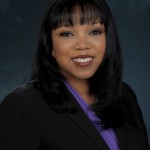
As the new director of philanthropy and community involvement at Southern California Edison (SCE), Tammy Tumbling (Class of ’90, B.S., business administration; ’94, MPA) is responsible for overseeing the company’s philanthropic interests and strategizing funding programs and priorities. Among these is Edison’s commitment to educating a “green” workforce through its $1,000,000 Green Jobs Education Initiative, which was conceived and launched by Tumbling earlier this year. The initiative provides 10 community colleges throughout the state with funding to support training programs in areas such as green building, renewable energy, energy efficiency, water and waste management, biofuels production, and alternative transportation.
Prior to her current position, Tumbling served as senior manager of SCE’s community involvement unit and senior manager in quality assurance in the company’s transmission and distribution business unit. She joined SCE in 1998 after serving as director of corporate development for the Music Center of Los Angeles and working on funding development and distribution for United Way of Greater Los Angeles. She is a board member of the National College Resource Foundation, the Conference Board Contributions Council, and serves on the advisory board of the Research & Policy Institute of California.
Dateline spoke recently to the 1987 CSU Dominguez Hills Homecoming Queen and former president of the university’s Alpha Kappa Alpha sorority about her mission to keep SCE at the forefront of a growing diverse green workforce, the importance of being a mother, and “paying it forward” as a mentor to her employees and the underserved students that Edison supports.
Dateline: What is SCE’s responsibility to the community – students in particular – in order to secure a better future for the environment?
Tammy Tumbling: Southern California Edison has been around for almost 125 years. We’ve been supporting our community for that amount of time and we will continue to do so in years to come.
It is the responsibility of the utility industry to be good corporate citizens, and how we do that is to set our focus on philanthropic resources in areas where our customer base is. Edison takes great pride in partnering with community-based organizations to address the immediate academic and social needs of the community during these difficult economic times.
Education is one of our top priorities at Edison. We want to strategically align our dollars with organizations that are supporting the environment and education [for] underserved populations.
Dateline: How can female and minority students begin to prepare for jobs in the environmental and energy fields?
TT: My recommendation is to get the right credentials. Prior to starting your degrees, find mentors in the industry you want to be in to make sure you are taking the right courses, working with the right people, and are staying abreast of the most current issues related to your field. Since we are a global society, it’s important to know what’s going on related to your field of interest, and what the key issues are at an international level.
Dateline: How did your education at CSU Dominguez Hills prepare you to work in a wide variety of roles at Edison?
TT: Dominguez Hills is a special place for me. It helped me to create the strong academic and leadership foundation that I needed in order to be a successful executive at Southern California Edison.
I chose Dominguez Hills because I grew up in the area, in the city of Compton, and it was one of the schools attended by people who I looked up to in my neighborhood. The [professors] had a genuine interest in the success of their students. It was an open campus with lots of diversity and a place – at the time I was a teen mom – that was able to accommodate the fact that I was raising a 2-year-old child.
During graduate school, I had the privilege of being in public administration classes with Drs. Justine Bell, David Karber and Foraker Smith. It was through their lectures and life experiences that I was able to transfer that knowledge to corporate America.
Dateline: What do you think has made you successful in your career and as a role model?
TT: I believe what has made me successful in my career are my perseverance, focus, and commitment to my own personal values, and not wavering, not going against those regardless of [my] environment. I was surrounded by so many great people along the way in my career and throughout college, that [mentoring is] a natural thing for me to do.
My two primary areas of focus in my life are the work that I do here at So Cal Edison and most importantly, being a parent to my four children, Aaron, Ashton, Amanda and Sekai. It is a juggling act but family always comes first. I’m fortunate to work for a company that recognizes the importance of their employees and their families.
My education at Cal State Dominguez Hills prepared me for the job I do today because of the diversity of the school, its focus on excellence, and each professor believing in the success of every student. I have taken the same approach that the school provided me in nurturing my employees.
I believe that as a leader in a corporation, my job extends beyond my staff. When you’re visible to every employee in the company, it is your responsibility to share your story and provide mentoring and coaching to employees to ensure that we’re preparing our future workforce.